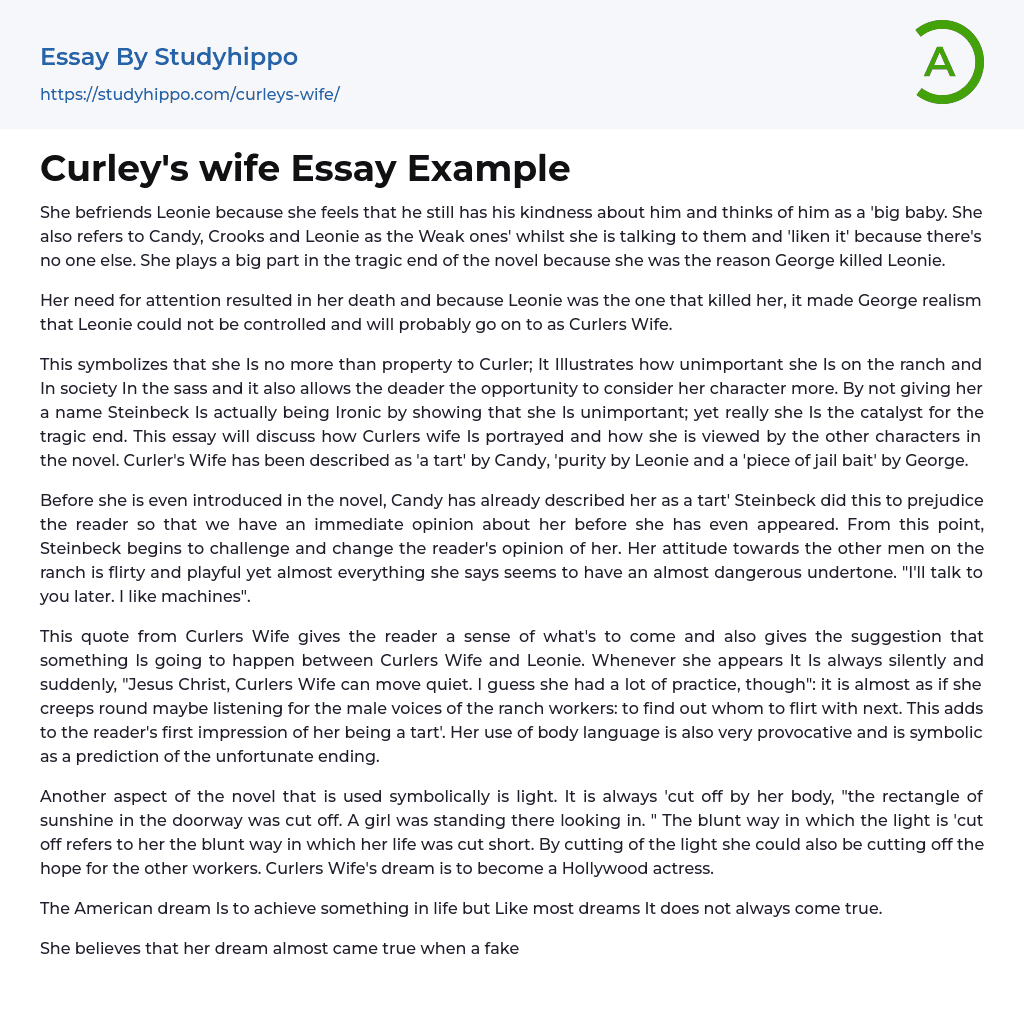In the novel, Curler's wife is portrayed as a lonely and attention-seeking character who befriends Candy, Crooks, and Lennie. Despite being referred to as the "Weak ones", Curler's wife enjoys their company as there is no one else around. Unfortunately, her need for attention plays a significant role in the tragic ending of the novel when George kills Lennie. As Lennie was responsible for her death, it made George realize that Lennie was uncontrollable and could become like Curler's wife. The fact that Steinbeck never gives her a name shows her unimportance on the ranch and in society, making her more of a symbol than an individual. Even though Candy calls her "a tart" initially, Steinbeck challenges and changes the reader's opinion of her throughout the novel.Curlers Wife's behavior towa
...rds the men on the ranch is flirtatious and playful, yet she often comes across as having a dangerous undertone. In one encounter with Lennie she says, "I'll talk to you later. I like machines." This quote suggests that something may happen between Curlers Wife and Lennie. Whenever she appears, it is sudden and silent, as if she is listening for male voices to find her next target. This contributes to the reader's view of her as a promiscuous woman. Her body language is also provocative and symbolic of her unfortunate ending.
The use of light in the novel is also symbolic, as it is always cut off by her body. For example, "the rectangle of sunshine in the doorway was cut off. A girl was standing there looking in." The abrupt cutting off of light refers to the blunt way in which her life wa
ended. Curlers Wife's dream is to become a Hollywood actress, which represents the American dream of achieving success. However, this dream does not always come true, as is demonstrated when a fake movie director offers her a chance to become a star.After he failed to call on her mother, she blamed him and believed her dream was over, leading her to marry Curler. The characters all had dreams that never came true, including George and Lennie’s dream of acquiring enough money for their own place. Candy joined their dream once they arrived at the ranch. Towards the end of the novel, Curler’s Wife confides in Lennie because she perceives him as being different from the other men. She recognizes his remaining kindness despite his bouts of violence and anger which was a common trait of other men on the ranch. She represents loneliness and uses attention-seeking as a coping mechanism which is almost ingrained within her heart. In contrast, Curler sees her as a sex object instead of providing emotional support and care for her feelings. Curler's Wife is viewed as one of the "Weak ones" in parallel with the bindle stiffs . Misunderstood by everyone who negatively judges what they see saying: "She had full, rouged lips...Evilly made up. She wore a cotton house dress and red mules." The color red symbolizes danger and foreshadowing forthcoming events. As Steinbeck slowly reveals more about her character, readers begin to recognize the lonely woman that others overlook. Despite being one of the most complex characters in the novel, Curler’s Wife remains difficult to interpret fully.Towards the end of the novel, the true nature of Curlers Wife
is revealed after her passing. This revelation reflects the 'nice girl' character Steinbeck initially intended to depict. The negative traits such as meanness, planning, discontent, and craving for attention that previously weighed her down were absent from her face. A subtle acknowledgement of her emotional pain and loneliness is revealed by the "ache for attention" comment, expressing the depth of her suffering before death. Steinbeck intentionally shapes readers' view on Curlers Wife by using terms such as "tart" and "jail-bait" at the outset. Through her behavior and actions, we slowly uncover her underlying loneliness and desperation: "talking to a bunch of bindle stiffs and liking' it cause there's no one else". Her tragic death finally sheds light on the anguish and isolation she suffered, shaping our mentality towards Curlers Wife as a victim of sexism during the 1930s.
- Ranch essays
- Nineteen Eighty-Four essays
- Maus essays
- Culture essays
- Social Control essays
- Citizenship essays
- Social Justice essays
- Caste System essays
- Social Responsibility essays
- Socialization essays
- Deviance essays
- Modern Society essays
- Popularity essays
- Civil Society essays
- Community essays
- Female essays
- Filipino People essays
- Igbo People essays
- Indigenous Australians essays
- Indigenous Peoples essays
- Minority Group essays
- Social Institution essays
- Men essays
- The nation essays
- Middle Class essays
- Social Norms essays
- Discourse Community essays
- Popular Culture essays
- Car Culture essays
- American Culture essays
- Mormon essays
- Indian Culture essays
- Mexican Culture essays
- Pop Culture essays
- Cultural Differences essays
- Culture Shock essays
- Different Cultures essays
- Fight club essays
- Training essays
- Athletic Shoe essays
- Gym essays
- Yoga essays
- Baseball essays
- Basketball essays
- Bodybuilding essays
- Boxing essays
- Football essays
- Golf essays
- Martial Arts essays
- Soccer essays




